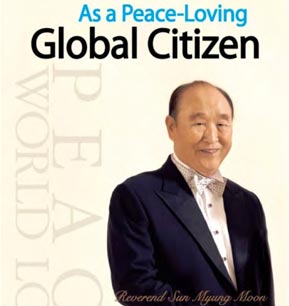ShareThis
Rev. Sun Myung Moon

As a Peace-loving Global Citizen is the autobiography of Rev. Sun Myung Moon, the founder of the Unification Movement. It was published in 2009 in both Korean and English by Gimm-Young Publishers of Seoul, South Korea. The book was released in South Korea on March 9, 2009 and debuted at #3 on the Businesss bestseller's list. It has ranked in various bestseller lists since then and was ranked 15th on the General bestseller's list as of October 14, 2009.
Heungnam Prison in the Snow
The Communist Party initiated dok-bo-hoi, or gatherings where newspapers or other materials were read aloud, as a way of studying communist propaganda. Also, we had to write letters of gratitude to Kim Il Sung. The Security Detachment kept a close watch on our every move. Every day we were told to write letters of gratitude saying what we had learned, but I never wrote even a single page of these. We were supposed to write something like this: “Our Father Kim Il Sung, out of his love for us, gives us food to eat each day, gives us meals with meat, and lets us lead such a wonderful life. I am so grateful.” I could not write anything of the sort. Even if I were looking death in the face, I could not submit such letters to the atheistic Communist Party. Instead of writing them I worked ten times harder than the others in order to survive in the prison. The only way I could get away with not writing these letters was if I were the number one prisoner. Because of this effort I became the best prisoner and even received an award from a Communist Party official.
My mother visited me many times while I was in prison. There was no direct transportation from Jungju to Heungnam. She had to take a train to Seoul, where she would change to a train on the Seoul-to-Wonsan line. The trip would take her more than twenty grueling hours. Before starting out she would go to great trouble to prepare mi-sut-karu, or powdered rice, for me, so that her son, who had been imprisoned in the prime of his life, would have something to eat. To make this powder she would gather rice from our relatives and even the distant relatives of my older sisters’ husbands. When she came to the prison visiting room and saw me standing on the other side of the glass, she would immediately begin to shed tears. She was a strong woman, but the sight of her son undergoing such suffering made her weak.
My mother visited me many times while I was in prison. There was no direct transportation from Jungju to Heungnam. She had to take a train to Seoul, where she would change to a train on the Seoul-to-Wonsan line. The trip would take her more than twenty grueling hours. Before starting out she would go to great trouble to prepare mi-sut-karu, or powdered rice, for me, so that her son, who had been imprisoned in the prime of his life, would have something to eat. To make this powder she would gather rice from our relatives and even the distant relatives of my older sisters’ husbands. When she came to the prison visiting room and saw me standing on the other side of the glass, she would immediately begin to shed tears. She was a strong woman, but the sight of her son undergoing such suffering made her weak.
My mother handed me the pair of silk trousers that I had worn on my wedding day. The prison uniform I was wearing had become threadbare, and my skin showed through the material. However, instead of wearing the silk trousers, I gave them to another prisoner. As for the mi-sut-karu that she had gone into debt to prepare, I gave it all away right there as she watched. My mother had invested her full heart and dedication into preparing clothing and food for her son, and she was heartbroken to see me giving away these things, without keeping anything for myself.
Thursday, November 25, 2010
|
Labels:
Heungnam Prison in the Snow part3
|
CONTENT
- FOREWORD
- CHAPTER ONE - Food is Love
- CHAPTER TWO - A River of Heart Flows with Tears
- CHAPTER THREE - The Man with the Fullest Stomach
- CHAPTER FOUR - Why We Work Globally
- CHAPTER FIVE - True Families Create True People
- CHAPTER SIX - Love Will Bring Unification
- CHAPTER SEVEN - Future of Korea, Future of the Wor...
- CHAPTER EIGHT - Message for Young People

